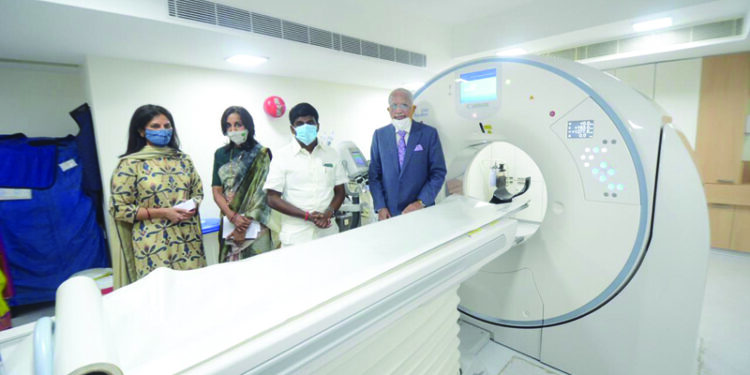NE HEALTH BUREAU
CHENNAI, SEPT 30
TN Health Minister Dr C Vijayabhaskar inaugurated the state-of-the-art aquilion one prism 640-slice CT scanner, cardiac diagnostic equipment at Apollo Hospital in Chennai on Wednesday.
Inaugurating the state-of-the-art aquilion one prism 640-slice CT scanner, the Minister for Health and Family Welfare said, “It is a matter of pride that Apollo Hospitals continues to bring the latest and best of medical technology to the state and country for the benefit of patients here. I congratulate Apollo Hospitals on the launch of this new advanced 640-slice CT scanner and am sure that this will benefit not just patients in Tamil Nadu, but patients from across India.’’
Addressing reporters, Dr. Vijayabhaskar appealed the people to follow COVID-19 protocols in public places, as the spread of the deadly virus could be controlled only with the help of all stakeholders.
Hospital Founder and Chairman Dr. Prathap C Reddy said the installation of new equipment was another step towards making the Prime Minister’s call for ‘Aatmanirbhar Bharat’ by providing world-class treatment in the country at a cheaper cost. The new CT scanner takes diagnosis to the next level, imaging the entire heart in less than one-third of a second to allow rapid diagnosis.
The diagnostic films can be available within two minutes to the doctors to start their next course of treatment for heart patients, Dr. Reddy added.
“The speed ensures there is no delay in either discharging the patient if there are no problems or making decisions for treatment course in case of coronary artery disease. If the problem is mild then follow-up can be continued. The other advantage is that it enhances patient safety as they are exposed to lower radiation levels,” he said.
The advanced Aquilion One Prism CT is quick enough to take an image in between two heartbeats. It is extremely easy to use and covers the whole heart in one rotation, which also makes it feasible for cardiac perfusion studies. The coronary CT and entire aortogram can be done together. The images produced by the scanner are crisp and clear and hence make the diagnosis very accurate, Dr. Reddy added.
Preetha Reddy, Vice-Chairperson, Apollo Hospitals said, “With the latest advances in medical technology, we are now in an era of non-invasive diagnosis and minimally invasive treatments for heart disease. The advanced non-invasive cardiology techniques allow early detection of heart disease, using external tests, as against instruments inserted into the body, to evaluate and diagnose cardiac disorders. Among these, cardiac CT allows us to rule out heart disease with 99% accuracy and avoid more invasive testing.
In early cases of heart disease, patients can be started on preventive therapy and management, while a patient with moderate to advanced heart disease that may lead to a heart attack, can be immediately referred for an angiogram, stenting or even surgery as required.”
Suneeta Reddy, Managing Director, Apollo Hospitals Group said, “At Apollo Hospitals, we have always believed in providing medical excellence with a human touch, and the advanced Aquilion One Prism CT is one more example of our approach. The new CT-scanner is more than just about cutting-edge technology, but about using technology to optimise patient care through accelerated clinical decision-making for accurate diagnosis and treatment planning. The scanner is the fastest in the world and allows us to enhance diagnosis of not in cardiology, but also neurology, oncology, gastroenterology, and paediatrics conditions in a safe, rapid, and precise manner. The dimensions of the new scanner also make it accessible to a larger patient population. We shall continue on our mission to make advanced healthcare accessible and affordable to more and more patients.”
The 640-slice CT scan system offers a non-invasive method to detect early coronary artery disease, which may eventually cause narrowed or blocked vessels in the heart. The larger bore of the advanced version can accommodate bariatric patients up to 315 kg of body weight, who may not fit in conventional scanners and patients with high heart rates. This allows diagnostic scanning for early CAD in this high-risk patient population, so that treatment can be started earlier. Post-operative checks after cardiac surgery can be performed without any invasive procedure and with the least discomfort while giving accurate information about coronary stents and bypass grafts, she added.









